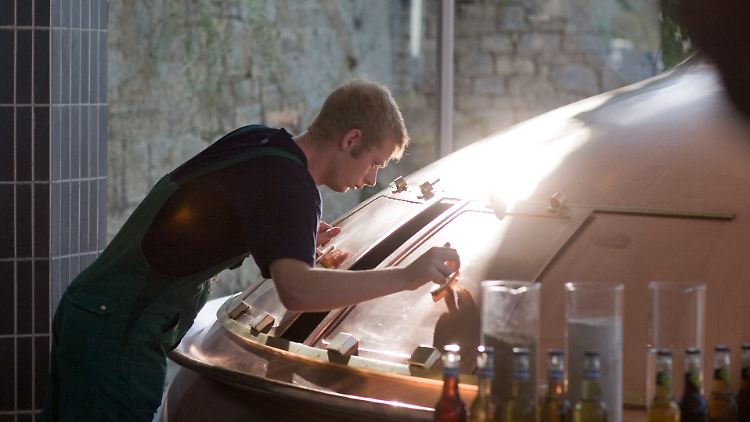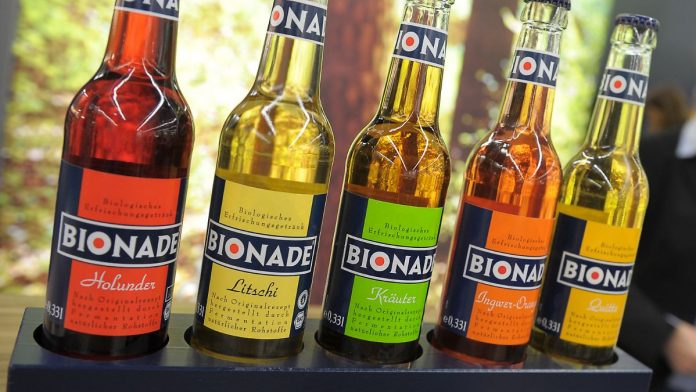In February 1994, a Bavarian brewer invented something new – a fruity, low-sugar and vegan lemonade. A lottery win saved him from ruin and made his vision possible. Bionade became a cult product and many companies are still trying to profit from the supposedly healthy beverage trend.
A look into a drinks store today looks different than it did in the 1980s. Where there used to be beer, water, juice and cola, there is now an almost unmanageable variety of colorful lemonades, sodas and soft drinks. Fritzlimo, Club-Mate, Fassbrause, Frohlunder, Lemonaid, Proviant, Now – many lemonades want to be much more than a thirst quencher, a statement for a conscious lifestyle. And they are no longer just aimed at young people, but at adults.
Fruity lemonades seem to be particularly popular in big cities. But the trend originated in the Franconian province. 30 years ago, on February 24, master brewer Dieter Leipold from the 3,000-person town of Ostheim vor der Rhön registered a patent for a new lemonade: Bionade.
Limo was not initially considered a limo
“What made Bionade special at the time was that it wasn't perceived as a lemonade at all,” says psychologist and market researcher Jens Lönneker from the Cologne-based market research institute Rheingold Salon. Cola and Fanta were already frowned upon as being too sweet. But with Bionade, the fear was gone: natural production, less sweet, smaller bottles than typical lemonades. “From the point of view of many consumers, this was a completely new beverage category,” says Lönneker.
According to company information, Leipold had been working on a new drink since the 1960s. But the idea gained momentum in the 1990s. The Peter family brewery in the Bavarian Rhön was doing poorly financially. Beer consumption in Germany is still declining today. In 2013, each citizen drank an average of 99 liters, but in 2023 that figure was 83 liters. The declining trend was already evident in the 1990s.
Leipold used his knowledge of brewing beer for Bionade: Bionade is also brewed with barley malt. The only difference is that no alcohol is produced. Following the example of bees, sugar is fermented to produce gluconic acid. The bottle is also based on the shape of a classic beer bottle.
Lottery winnings invested in Bionade
The story of Bionade is something like a fairy tale: a family business is fighting for survival. Then comes a saving idea. But it is initially misunderstood. The big breakthrough does not come. Then Leipold's wife wins the lottery and invests the money in the company. A new design follows, the first drinks wholesaler and finally Bionade becomes a cult. From the Bavarian provinces to trendy clubs across the country. That is more or less the story that Bionade likes to tell.


A master brewer from Bionade GmbH looks into a brew kettle – this is where the liquid components are separated from the solid components
(Photo: picture alliance / photothek)
Today, the beverage idea also secures the income of farmers in the area. Many fields in the area have become elderberry fields. According to the company, elderberry is the most popular variety. Other varieties that were unthinkable for lemonades 40 years ago are lychee, herbs, orchard fruit and lemon-bergamot.
Bionade is no longer independent. With a detour via the Radeberger Group, which belongs to the Oetker Group, the brand has been part of the Hessian Hassia Group since 2018. Despite rollercoaster rides with temporary drops in demand, Bionade appears to continue to be successful: In 2022, the brand says it achieved a six percent increase in sales.
Between organic and Biedermeier
“Bionade was a completely new type of soft drink. With its low calorie content, it was well ahead of the times,” says Detlef Groß, managing director of the Berlin-based non-alcoholic beverages association (WAFG). Many other beverage manufacturers followed suit. Bionade took legal action against visually similar products. But other non-alcoholic drinks also became popular. In 2010, the Cologne brewery Gaffel launched a draft soda. Club-Mate began to compete with cola as a caffeinated beverage.
Some manufacturers have gone one step further and presented themselves as even more ethical: the new sodas are not only organic, but also fairly produced and sustainable. Vegan, of course. Drinking for a better world, so to speak. Bionade is also committed to biodiversity and environmental education and has been using CO2-neutral electricity for years. Fritz-Kola came up with a “drink from glass” campaign against plastic waste. Some manufacturers such as Lemonaid and the Premium Collective joined forces in 2010 to form an “Association of Proper Beverage Manufacturers” – but nothing has been heard or read about this since.
The target group for the “good sodas” includes the so-called LOHAS (Lifestyle of Health and Sustainability). People who want to live healthily and sustainably. Often meant in a derogatory way, the term “Bionade-Biedermeier” has been used for years to describe well-off city dwellers who position themselves politically through sustainable consumption. According to a Yougov survey, the proportion of vegetarians and vegans among Fritz Kola customers is 50 percent higher than in the general population.
Indulgence trading in the beverage market
It is questionable how healthy the trendy sodas really are. It is true that some of them contain less sugar than the soft drinks of the 1980s. Some of the cult drinks are not even officially sodas. For a soda, the sugar content must actually be at least seven percent. But even the “new” drinks contain several grams of sugar.
Marketing makes a difference, says psychologist Lönneker. He compares it to a sale of indulgences. “These drinks make you one of the good guys again and you can still drink the tasty stuff that you previously rejected as unhealthy,” says Lönneker. He sees similar so-called rationalizations in meat alternatives.
“Startups with a garage founder mentality often have a hard time”
According to WAFG, there is no exact number of products available as lemonades and similar non-alcoholic beverages in Germany. “We have a large number of new product launches, but only a few are able to hold their own on the market,” says managing director Gross. The effort required to get off the ground on the market is great. The key to success is a good product, but you also need to be familiar with food and packaging law. In addition, the lemonade market is not a niche market. In addition to international corporations, mineral water springs, breweries and regional manufacturers are involved. “Start-ups with a garage founder mentality therefore often have a hard time,” says Gross.
In addition to lemonades, other trendy products such as iced teas and energy drinks are also part of the soft drinks category. Water with fruit additives – now known as “near-water” products – is also increasingly appearing in beverage stores. According to WAFG, low-calorie drinks are particularly popular, but classic colas and lemonades make up the majority of the market. Germans drink around 80 liters of lemonades and colas per capita per year, according to WAFG figures. In addition, there are around six liters each of spritzers, water with flavors, energy drinks and sodas, and ten liters of fruit juice drinks.
Psychologist Lönneker sees waves on the market that last about seven to ten years: sometimes the trend is more towards abstinence and water, other times more towards gluttony and flavored, sweet drinks. “When life seems difficult, many people want to treat themselves to something with drinks,” says Lönneker. In view of social challenges such as wars, climate change and political unrest, he also sees a trend towards sweetening life. With a clear conscience, of course.


